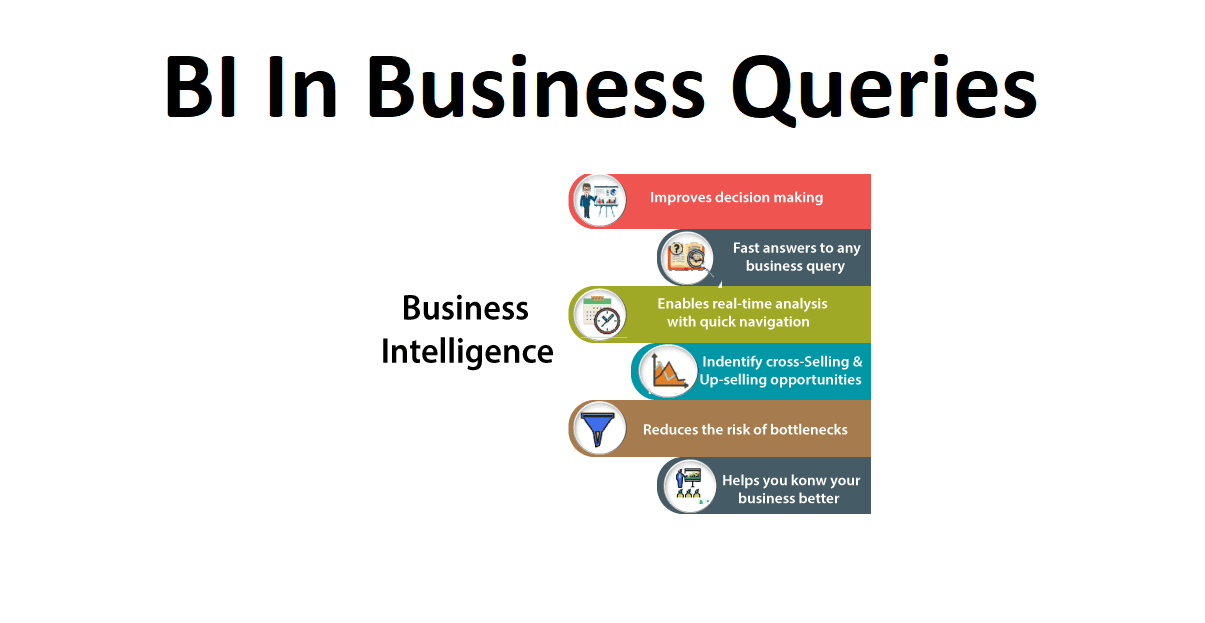
In the dynamic world of business, effective decision-making is the cornerstone of success. At the heart of this process lies the power of Business Queries,insightful questions that businesses pose to gain valuable understanding from their data. These queries, when crafted thoughtfully and answered with the aid of robust data analytics tools, can unlock a treasure trove of information, enabling businesses to navigate challenges, identify opportunities, and optimize their performance.
Businessqueries encompass a wide spectrum, ranging from broad strategic questions to specific operational inquiries. They delve into various aspects of an organization, seeking insights into customer behavior, market trends, financial performance, and operational efficiency. By asking the right questions, businesses can uncover hidden patterns, identify areas for improvement, and make informed decisions that drive growth and enhance their competitive edge.
What Is Business Query?
A business query is a question that businesses ask themselves in order to gain insights into their operations, customers, and market. These queries can be used to help businesses make better decisions, improve their performance, and identify new opportunities.
How Queries Can Benefit Your Business?
Queries can benefit your business in a number of ways. They can help you:
- Enhancing Risk Management -Business queries can be used to identify and assess potential risks by analyzing historical data, customer feedback, and market trends.
- Optimizing Operations -Business queries can be used to analyze operational data from production, inventory, and resource utilization to identify inefficiencies, bottlenecks, and areas for improvement.
- Identifying Market Trends -Business queries can be used to analyze sales data, website traffic, and social mediaengagement to identify trends in customer behavior, market demand, and competitor activity.
- Gaining Customer Insights -Business queries can help businesses understand their customer base better by analyzing data from customer interactions, purchase history, and demographic information.
- Make better decisions -Queries can help you gather information and insights that you can use to make better decisions about your business. For example, you can use queries to track sales trends, identify customer demographics, and measure the effectiveness of marketing campaigns.
- Improve efficiency -Queries can help you automate tasks and streamline processes, which can free up your time to focus on more strategic work. For example, you can use queries to automatically generate reports, track inventory levels, and send targeted email campaigns.
- Reduce costs -Queries can help you identify and eliminate waste, which can save you money. For example, you can use queries to identify underperforming products, optimize pricing strategies, and negotiate better deals with suppliers.
- Increase customer satisfaction -Queries can help you understand your customers better and improve their experience. For example, you can use queries to track customer feedback, identify customer serviceissues, and develop personalized marketing campaigns.
10 Business Queries To Make Smart Moves
Business queries can be broad or specific, and they can be asked at any stage of a business's life cycle. Some examples of business queries include:
Here are 10 business queries to make smart moves:
1. What Are Your Biggest Challenges And Opportunities?
This question helps you identify the key areas where your business needs to focus its efforts. Once you know your challenges and opportunities, you can start to develop strategies to address them.
2. How Can We Improve Our Customer Satisfaction?
This question helps you understand how your customers perceive your products or services. By understanding their needs and wants, you can make changes to improve their satisfaction.
3. What Are Our Target Customers' Needs And Wants?
This question helps you define your target market and develop marketing and sales strategies that are tailored to their needs.
4. What Are Our Competitors Doing Well?
This question helps you identify your competitors' strengths and weaknesses. By understanding your competitors, you can develop strategies to differentiate your business.
5. How Can We Differentiate Ourselves From Our Competitors?
This question helps you identify what makes your business unique. By understanding your unique selling proposition (USP), you can develop marketing and sales strategies that highlight your advantages.
6. What Are Our Key Performance Indicators (KPIs)?
This question helps you track your progress and identify areas where you need to improve. KPIs are specific, measurable, achievable, relevant, and time-bound (SMART) goals that help you measure your business's success.
7. How Can We Improve Our Profitability?
This question helps you identify ways to increase your profits. By understanding your costs and revenue, you can develop strategies to improve your bottom line.
8. What Are Our Financial Goals?
This question helps you set clear financial goals for your business. By having clear goals, you can develop a plan to achieve them.
9. How Can We Attract And Retain Top Talent?
This question helps you create a workplace that attracts and retains top talent. By offering competitive compensation, benefits, and opportunities for growth, you can create a culture that attracts and retains top talent.
10. How Can We Create A More Innovative And Entrepreneurial Culture?
This question helps you encourage innovation and entrepreneurship within your business. By creating an environment that encourages creativity and risk-taking, you can foster a culture that drives innovation.
By asking these 10 business queries, you can gain valuable insights that can help you make smart moves and achieve your business goals.
What Are The Types Of Business Queries?

Business queries are questions that businesses ask themselves to gain insights into their operations, customers, and market. These queries can be broad or specific, and they can be asked at any stage of a business's life cycle.
- Competitive queries -These queries help businesses understand their competitors' strengths and weaknesses, develop strategies to differentiate their business, and gain a competitive advantage.
- Product queries -These queries help businesses develop new products, improve existing products, and position their products in the market.
- Customer queries -These queries help businesses understand their customers' needs and wants, improve their customer satisfaction, and retain their customers.
- Marketing queries -These queries help businesses understand their target market, develop effective marketing campaigns, and measure the results of their marketing efforts.
- Financial queries -These queries help businesses understand their financial performance, identify risks, and make sound financial decisions.
- Operational queries -These queries help businesses track their performance, identify areas for improvement, and make informed decisions about their operations.
- Strategic queries -These queries help businesses define their goals, identify their target market, and develop strategies to achieve their objectives.
Implementing Business Queries For Strategic Advantage
Implementing business queries for strategic advantage is a crucial step for organizations seeking to enhance their decision-making processes, optimize performance, and gain a competitive edge.
By effectively embedding business queries into their operations, businesses can unlock valuable insights from data, enabling them to identify opportunities, address challenges, and make informed strategic decisions that drive growth and success. To achieve this, businesses should adopt a comprehensive approach that encompasses several key aspects:
1. Continuous Improvement - Embrace a continuous improvement mindset by regularly reviewing and refining business queries to ensure they remain relevant, effective, and aligned with evolving business needs and objectives.
2. Measuring Impact and Effectiveness -Regularly evaluate the impact and effectiveness of business queries. Track how insights derived from queries have influenced decision-making, improved performance, and contributed to organizational success.
3. Aligning Queries with Goals and Objectives -Ensure that business queries are aligned with the organization's overall goals and objectives. Prioritize queries that address critical business issues, contribute to strategic initiatives, and support the achievement of organizational goals.
4. Fostering a Data-Driven Culture -Cultivate a data-driven culture within the organization by promoting the value of data, encouraging data literacy, and investing in data infrastructure and analytics capabilities.
5. Integrating Queries into Decision-Making -Embed business queries into the decision-making process at all levels of the organization. Encourage employees to ask questions, seek data-driven insights, and make informed decisions based on evidence rather than assumptions.
6. Transforming Insights into Actionable Strategies -Translate insights derived from business queries into actionable strategies and decisions that drive organizational growth. Use the findings to identify new opportunities, address operational inefficiencies, improve customer satisfaction, and gain a competitive edge.
7. Employing Appropriate Research Methods -Select and employ appropriate research methods and techniques to gather, analyze, and interpret data effectively. Quantitative methods, such as statistical analysis and regression modeling, can provide numerical insights into trends and relationships. Qualitative methods, such as surveys, interviews, and focus groups, can provide deeper understanding of customer perceptions, motivations, and behaviors.
8. Utilizing Relevant Data Sources -Identify and utilize appropriate data sources that provide accurate, reliable, and relevant information to address the query. Consider internal data sources such as customer databases, financial records, and operational data, as well as external data sources such as market research reports, industry trends, and competitor analysis.
9. Formulating Clear Questions -Craft clear, concise, and targeted questions that seek to uncover specific insights and actionable information. Avoid vague or overly broad questions that may lead to ambiguous or irrelevant results.
10. Defining Purpose and Scope - Clearly articulate the purpose of each business query, ensuring it aligns with organizational goals and objectives. Determine the scope of the query, identifying the specific data sources, information requirements, and analysis methods needed to address the query effectively.
How Business Intelligence Helps In Business Queries?
Business intelligence (BI) is a broad term that encompasses the processes, methodologies, and technologies used to collect, analyze, and interpret data to gain insights and inform better decision-making. It empowers businesses to understand their operations, customers, and market trends, enabling them to identify opportunities, address challenges, and optimize their performance.
In the context of business queries, BI plays a crucial role in providing the data and tools necessary to formulate and answer insightful questions. It facilitates the transformation of raw data into meaningful information, allowing businesses to extract hidden patterns, trends, and correlations that would otherwise remain obscured.
Some BI Tools For Business Queries
There are numerous business intelligence (BI) tools available to help businesses analyze data, generate insights, and make informed decisions. These tools range from simple and affordable options to powerful and enterprise-grade solutions. Here are some of the most popular BI tools for business queries:
- Metabase -Metabase is an open-source BI platform that is designed to be easy to use and accessible to everyone in the organization. It is a good choice for companies that want to empower their employees to explore and analyze data without the need for specialized technical skills.
- Yellowfin BI -Yellowfin BI is a cloud-based BI platform that is known for its social collaboration features. It allows users to share insights and collaborate on reports, fostering a data-driven culture within the organization.
- Zoho Analytics - Zoho Analytics is a cloud-based BI platform that offers a comprehensive set of features for data analysis, visualization, and reporting. It is a popular choice for small and medium-sized businesses due to its affordability and ease of use.
- Sisense -Sisense is a cloud-based BI platform that is known for its embeddable analytics capabilities. It allows businesses to integrate BI features directly into their applications and websites.
- Domo -Domo is a cloud-based BI platform that is designed for real-time data analysis and visualization. It allows users to monitor key performance indicators (KPIs) and track business trends in real time.
- SAP Business Objects -SAP Business Objectsis a comprehensive BI suite that offers a wide range of tools for data analysis, reporting, and dashboard creation. It is a popular choice for large enterprises that require a robust and scalable BI solution.
- Looker -Looker is a cloud-based BI platform that is particularly well-suited for large enterprises with complex data needs. It offers a strong data modeling framework and advanced analytical capabilities.
- Qlik Sense -Qlik Sense is another popular BI platform that offers a user-friendly interface and advanced data discovery capabilities. It is known for its associative engine, which allows users to explore data freely and uncover hidden relationships.
- Tableau -Tableau is a leading BI platform known for its intuitive drag-and-drop interface and powerful data visualization capabilities. It is widely used for creating interactive dashboards and reports that can communicate insights effectively.
- Microsoft Power BI -Power BI is a cloud-based BI tool from Microsoft that offers a wide range of features for data analysis, visualization, and reporting. It is a popular choice for businesses of all sizes due to its ease of use, affordability, and integration with Microsoft Office 365.
Frequently Asked Questions About Business Queries
What Tools Can I Use To Answer Business Queries?
There are a variety of tools that you can use to answer business queries, including:
- Data analysis tools
- Business intelligence (BI) platforms
- Surveys and focus groups
- Market research reports
Who Should Be Asking Business Queries?
Everyone in an organization should be asking business queries. This includes executives, managers, employees, and customers.
How Can I Measure The Impact Of My Business Queries?
The impact of your business queries can be measured by:
- Tracking customer satisfaction
- Monitoring sales figures
- Measuring employee engagement
- Evaluating new product launches
Conclusion
Navigating the complexities of the business world demands constant curiosity and a thirst for knowledge. Our commitment to providing comprehensive solutions to your business queries remains unwavering. We understand that success in the ever-evolving landscape of commerce requires more than just generic advice—it demands tailored strategies and innovative approaches.
As you continue your journey in the realm of business, remember that our platform stands as your ally, offering not just answers but a roadmap for growth. Embrace change, stay informed, and leverage the insights and expertise we offer. By continuously seeking knowledge, adapting to market trends, and implementing effective strategies, you position yourself at the forefront of progress. Together, let's unlock the potential of your business and propel it towards sustained success in the competitive market."


